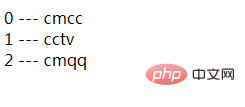
There are two tags in thinkphp6 that can realize array looping (volist tag and foreach tag). Let's follow the editor to see the use of these two tags.

First type: volist tag
Syntax:
{volist name="" id="" key="" offset="" length=""}
循环体
{/volist}Among them:
name: the variable name of the current template;
id: the current loop variable;
key: subscript, starting from 1 by default;
offset: the starting line number;
length: the obtained line number.
Example:
Define array:
<?php
namespace app\controller;
use think\facade\View;
class Test{
public function index(){
$arr=[
['id'=>1,'name'=>'cmcc'
],['id'=>2,'name'=>'cctv'
],['id'=>1,'name'=>'cmqq'
]
];
view::assign('arr',$arr);
return view::fetch();
}
}
?>Traverse in template:
{volist name="arr" id="vv" key="kk" offset="1" length="1"}
<div>
{$kk} --- {$vv['name']}
</div>
{/volist}Output result:

We set the interception to start from 1 and intercept one, so the output result is cctv.
Second type: foreach tag
Syntax:
{foreach $name as $key=>$id}
循环体
{/foreach}Among them:
foreach is the same as that of volist, so we won’t write it here anymore, we will directly Look at the traversal in the template.
{foreach $arr as $k=>$v}
<div>
{$k} --- {$v['name']}
</div>
{/foreach}
We can see that the foreach tag needs to be added when looping. #$ (dollar sign), and the volist tag does not need to be added with $ (dollar sign) when recycling.
The latest 10 thinkphp video tutorials
The above is the detailed content of Detailed explanation of two ways of looping in thinkphp6. For more information, please follow other related articles on the PHP Chinese website!
 How to use blockquote tag
How to use blockquote tag
 setinterval usage
setinterval usage
 what does usb interface mean
what does usb interface mean
 What are the advantages and disadvantages of decentralization
What are the advantages and disadvantages of decentralization
 How to use the axis function in Matlab
How to use the axis function in Matlab
 Solution to the problem that win7 system cannot start
Solution to the problem that win7 system cannot start
 How to write html text box code
How to write html text box code
 The phone cannot connect to the Bluetooth headset
The phone cannot connect to the Bluetooth headset
 What does web server mean?
What does web server mean?